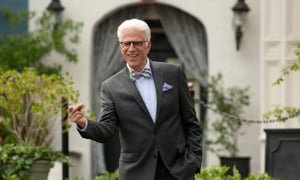The Good Place’s original premise is based on an immoral and selfish Eleanor who dies and is accidentally sent to a pleasant Heaven which is non-denominational. On getting to this Heaven, she decides that she needs to become better so she’ll be deemed worthy to remain there.
The show is humorous and has several interesting features, and moral Philosophy is one of the exciting features of this sitcom. It is not just a comedy because it can also serve as an interesting thesis for undergraduates. Some of the philosophical theories explored in the sitcom include:
1. Aristotelianism
Eleanor enjoys the help of Michael and her acclaimed soulmate, the professor of philosophy, Chidi Anagonye (a role played by William Harper). Michael, the core architect of The Good place is perfectly named after the creator of the show and also a Biblical archangel. Chidi starts to teach Eleanor the classics of Aristotle, Socrates, and Plato all in a bid to help her get a better personality.
It will be noted that the teachings of Aristotle underlies modern philosophy. In particular, it helps the development of the application of the logic rules as an ideal means of getting the truth.

2. Utilitarianism
Utilitarianism is the philosophy several people gravitate towards the most when they get to the university based on the fact that it makes a whole lot of sense on the surface level.
However, upon a deeper analysis, they soon discover that their first impression might not be the best. Utilitarianism rests on the idea that a moral action is an action which provides the highest good for the largest number of individuals. This appears smart and logical on the face of it but upon further questions such as the place of natural justice and unintended consequences, it may end up losing its sensibility in one’s mind.

This idea is perfectly illustrated by the Trolley Problem. In this illustration, a runaway tram is trolling a path towards some workers on its track and will eventually kill all of them, unless a switch is thrown to change the direction of its track where just one person will be killed.
The question now becomes whether it is better to allow more people die due to an accident as well as inaction, or will the better alternative be to actively murder an innocent bystander who is totally uninvolved.
In this sitcom, Michael decides that the better approach will be to practicalize it and so puts a trolley within Chidi’s control. The trolley ends up crushing people in gory ways.
3. Deontology
The ethics of deontology is focused on the morality of a person’s actions with the diverse school of thoughts aiming to establish specific rules, which upon obedience will give rise to the production of ethical behavior. Each of the rules usually concerns the duty of one person to other people. Chidi’s beloved, Kant, was particularly big on that idea.
Deontology has visible flaws since there is a major issue on what these rules ought to be and who sets the rules. However, it offers moral clarity to an extent if it is not deeply analyzed.
Michael uses a particular quiz to determine whether a person is good or not. The quiz evidently contains these questions that are rule-based. For example, there is a question inquiring whether or not a person has paid to listen to a musical performance by the Red Hot Chili Peppers.

4. Existentialism
The focus of this theory is the establishment of behavioral rules for ethics in practice. An individual’s position as a moral agent is the theory’s starting point. It doesn’t agree with the notion of a contrary moral ideal that requires an individual to act with some sort of moral authenticity. It has been described as a philosophy suitable for boys in their teenage years.
This theory is examined severally in this sitcom. In fact, a whole episode is developed on the notion of Søren Kierkegaard that complete freedom only comes when a person has a total faith in himself and in life.
Also, Chidi reveals in the course of the sitcom that he is working on a rap music that is Hamilton-styled to help Michael’s understanding of ethical philosophy. The totality of the first series, regardless of several digressions into his ethics tutorials, is later shown to primarily be an extension of the afterlife play by Jean-Paul Sartre.




